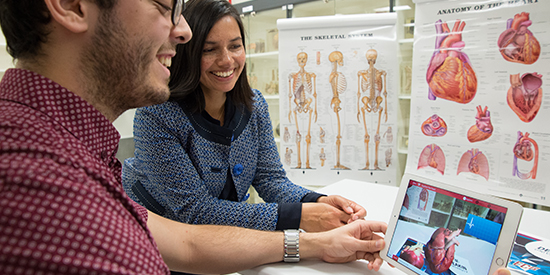New app places pumping heart virtually in the hands of medical students
Media releaseInstead of asking students to put their smart phones away during class, Deakin University’s School of Medicine is embracing the technology in its classes, using them to perform and interpret an ECG (electrocardiogram).
Through a new app, developed by the Deakin Medical School and the University’s eSolutions department, a beating heart essentially floats above a marker in front of the students and can be manipulated for learning purposes.
Deakin Medical School senior lecturer Dr Karen D’Souza said the interactive use of touch and 3D spatial manipulation of the heart meant educators could foster deeper learning and understanding than in the past.
“Students normally learn about the ECG from multiple text books that contain different concepts on the anatomy and physiology of the heart. They then have to connect their learning from these two dimensional resources for what is really a 3D concept in the real body,” Dr D’Souza said.
“With this new app, called the cARdiac ECG, students can now see the heart in 3D, move it around to see how the blood is pumping and where the electrical impulses are firing based on various scenarios from normal, abnormal and catastrophic heart function.
“They can also learn how to place the electrodes on a real-time synchronised animation of the body and see how this relates to the way the heart functions and how this all looks on the ECG trace.
“Our first and second year students who have been using the app are reporting that they are gaining far deeper understanding of how to correlate an ECG with what is actually going on in the heart.”
Dr D’Souza said the app was also portable.
“Now we are literally placing the ECG learning resources within the student’s pocket, through their smart phone or tablet, so they can access the material whenever, and wherever they wish,” she said.
“This is particularly valuable for students who are actively engaged in seeing patients. The pocket resource can be used in the hospital ward or general practice clinic, providing mobile, flexible just in time learning.”
Deakin’s Chief Digital Officer, William Confalonieri, said the cARdiac ECG was the first in a suite of projects to provide targeted AR experiences designed to make the way people, from students to visitors, experience Deakin richer and more rewarding.
“We see the cARdiac ECG experience as an exemplar for the effective use of AR to enhance teaching and learning capabilities across Deakin in the future,” Mr Confalonieri said.
“Embracing this new channel to deliver engaging course material and experiences that are valued by our students is a clear example of how Deakin is providing a premium learning experience underpinned by the use of digital technologies.”
The team that produced the cARdiac ECG app were awarded one of Deakin’s highest teaching awards, the Jim and Alison Leslie Award for Outstanding Achievement in Teaching and Learning, by the Vice-Chancellor of Deakin University Professor Jane den Hollander today.

